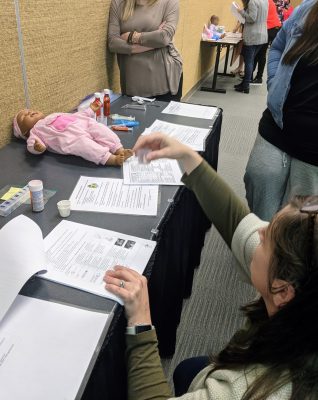Public health in practice: The NC Child Care Health and Safety Resource Center
June 15, 2022
By Amy Fulk
A program of the UNC Gillings School of Global Public Health’s Department of Maternal and Child Health, the NC Child Care Health and Safety Resource Center engages in public health practice that improves child care throughout North Carolina by training and supporting child care health consultants (CCHCs). CCHCs are health professionals who work with programs to assess, plan, implement, and evaluate strategies to achieve high-quality, safe and healthy child care environments.

The North Carolina Child Care Health and Safety Resource Center provides resources that can ensure safe and high-quality child care.
“As there is no system of school nurses for child care in N.C., CCHCs are the health professionals who support the safe and healthy attendance of children in child care,” says Jacquie Simmons, MScPH, the Resource Center’s project director.
Typically, CCHCs serve the child care facilities in their county or region and prioritize services based on need, such as those that serve children with special health care needs, those that serve infants and toddlers, and those that serve children who are at higher risk for poor health outcomes. Common training topics include safe sleep, medication administration, and emergency preparedness and response. CCHCs also conduct classroom and facility assessments and develop quality improvement plans with facility staff. These quality improvement plans include best practice recommendations, on-site trainings and technical assistance, with the goal of assisting facilities in increasing their capacity using a strengths-based approach.
“My favorite part of my job is doing Assessments within Early Childhood Education (ECE) programs,” says Cindy Smith, a CCHC for the Albemarle Alliance for Children and Families. A nurse with more than 25 years of experience who completed her CCHC training through UNC in 2009, she serves about 70 childcare facilities in northeast N.C.
“My work entails using a Health and Safety Assessment Encounter Tool which allows me to observe recommended state regulations and national standards. If risks are identified, I work in collaboration and partnership with the director and teachers to promote best practice as well as their knowledge and autonomy in recognizing health and safety concerns,” Smith says. “I am passionate about young children and see every [health and safety] assessment as an opportunity to support them. I work to help early childhood educators (ECE) not only understand what needs to be done to give children a safe and healthy environment but also to understand the rationale for why it needs to be done. The why is so, so important.”
Until recently, about 40% of N.C.’s counties – many of which were traditionally underserved by health services – lacked access to child care health consultant services. The COVID-19 pandemic changed that.
As the pandemic spread throughout all counties, state leaders realized that access to CCHC services in all counties was critical to help childcare facilities to safely stay open throughout the pandemic – and asked the N.C. Child Care Health and Safety Resource Center for more help. N.C. Resource Center staff, including CCHC coaches, adjusted their scope of work to provide local COVID-specific support to all counties that did not have a local CCHC. CCHCs answered phones night and day, providing ongoing guidance about everything from proper mask-wearing, understanding when to close, and explaining quarantine and isolation times.
Not only did the CCHC Coaches expand their reach, but they also helped draft and redraft the Child Care Strong N.C. Public Health Toolkit and provided ongoing expertise on preventing the spread of infectious disease in the childcare setting to childcare providers, N.C. Department of Health and Human Services leadership, colleagues and partners in the field.
This new spotlight on CCHCs led the N.C. Department of Health and Human Services Division of Child Development and Early Education, in partnership with the N.C. Partnership for Children, to commit to funding for up to 24 new CCHC positions across the state. In addition, the N.C. Resource Center received funds to hire two CCHCs to provide support to 12 counties that were not able to hire local CCHCs so that N.C. is now close to having full CCHC coverage.

Dr. Tamar Ringel-Kulka
“All staff members at the Center exhibit strong dedication and commitment to the wellbeing of children in early childhood education environments,” says Tamar Ringel-Kulka, MD, MPH, assistant professor of maternal and child health and principal investigator and director of the NC Resource Center. “Our service to, and partnership with, the State and State-sponsored agencies allows the School to connect and understand the needs of communities in different regions and counties of North Carolina. It provides opportunities for faculty and students to contribute to, learn from and study the health and safety of children in early education settings and, most importantly, help address inequities.”
Smith says she finds the Resource Center’s quarterly webinars and additional resources truly valuable to her work as a CCHC. The Center also provides CCHCs with health and safety trainings, continuing professional development, and support and connections with local, regional and statewide child health and childcare partners.
“The Center’s staff are pivotal with what’s going on at state level and sharing current knowledge and information with us,” Smith says. “They give us everything we need to do our work.”
Contact the UNC Gillings School of Global Public Health communications team at sphcomm@unc.edu.
